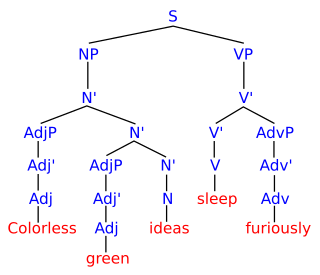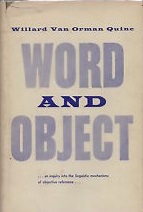
Charles Francis Hockett was an American linguist who developed many influential ideas in American structuralist linguistics. He represents the post-Bloomfieldian phase of structuralism often referred to as "distributionalism" or "taxonomic structuralism". His academic career spanned over half a century at Cornell and Rice universities. Hockett was also a firm believer of linguistics as a branch of anthropology, making contributions that were significant to the field of anthropology as well.

Language is a structured system of communication that consists of grammar and vocabulary. It is the primary means by which humans convey meaning, both in spoken and written forms, and may also be conveyed through sign languages. The vast majority of human languages have developed writing systems that allow for the recording and preservation of the sounds or signs of language. Human language is characterized by its cultural and historical diversity, with significant variations observed between cultures and across time. Human languages possess the properties of productivity and displacement, which enable the creation of an infinite number of sentences, and the ability to refer to objects, events, and ideas that are not immediately present in the discourse. The use of human language relies on social convention and is acquired through learning.
In linguistics and related fields, pragmatics is the study of how context contributes to meaning. The field of study evaluates how human language is utilized in social interactions, as well as the relationship between the interpreter and the interpreted. Linguists who specialize in pragmatics are called pragmaticians. The field has been represented since 1986 by the International Pragmatics Association (IPrA).
In the philosophy of language and linguistics, speech act is something expressed by an individual that not only presents information but performs an action as well. For example, the phrase "I would like the kimchi; could you please pass it to me?" is considered a speech act as it expresses the speaker's desire to acquire the kimchi, as well as presenting a request that someone pass the kimchi to them. According to Kent Bach, "almost any speech act is really the performance of several acts at once, distinguished by different aspects of the speaker's intention: there is the act of saying something, what one does in saying it, such as requesting or promising, and how one is trying to affect one's audience". The contemporary use of the term goes back to J. L. Austin's development of performative utterances and his theory of locutionary, illocutionary, and perlocutionary acts. Speech acts serve their function once they are said or communicated. These are commonly taken to include acts such as apologizing, promising, ordering, answering, requesting, complaining, warning, inviting, refusing, and congratulating.

Colorless green ideas sleep furiously was composed by Noam Chomsky in his 1957 book Syntactic Structures as an example of a sentence that is grammatically well-formed, but semantically nonsensical. The sentence was originally used in his 1955 thesis The Logical Structure of Linguistic Theory and in his 1956 paper "Three Models for the Description of Language". There is no obvious understandable meaning that can be derived from it, which demonstrates the distinction between syntax and semantics, and the idea that a syntactically well-formed sentence is not guaranteed to be semantically well-formed as well. As an example of a category mistake, it was used to show the inadequacy of certain probabilistic models of grammar, and the need for more structured models.
Syntactic ambiguity, also called structural ambiguity, amphiboly or amphibology, is a situation where a sentence may be interpreted in more than one way due to ambiguous sentence structure.
Psycholinguistics or psychology of language is the study of the interrelation between linguistic factors and psychological aspects. The discipline is mainly concerned with the mechanisms by which language is processed and represented in the mind and brain; that is, the psychological and neurobiological factors that enable humans to acquire, use, comprehend, and produce language.

John Langshaw Austin was a British philosopher of language and leading proponent of ordinary language philosophy, best known for developing the theory of speech acts.
In pragmatics, a subdiscipline of linguistics, an implicature is something the speaker suggests or implies with an utterance, even though it is not literally expressed. Implicatures can aid in communicating more efficiently than by explicitly saying everything we want to communicate. The philosopher H. P. Grice coined the term in 1975. Grice distinguished conversational implicatures, which arise because speakers are expected to respect general rules of conversation, and conventional ones, which are tied to certain words such as "but" or "therefore". Take for example the following exchange:
In the philosophy of language and speech acts theory, performative utterances are sentences which not only describe a given reality, but also change the social reality they are describing.
In semiotics, linguistics, anthropology, and philosophy of language, indexicality is the phenomenon of a sign pointing to some element in the context in which it occurs. A sign that signifies indexically is called an index or, in philosophy, an indexical.
In linguistics, prosody is the study of elements of speech that are not individual phonetic segments but which are properties of syllables and larger units of speech, including linguistic functions such as intonation, stress, and rhythm. Such elements are known as suprasegmentals.

Relevance theory is a framework for understanding the interpretation of utterances. It was first proposed by Dan Sperber and Deirdre Wilson, and is used within cognitive linguistics and pragmatics. The theory was originally inspired by the work of Paul Grice and developed out of his ideas, but has since become a pragmatic framework in its own right. The seminal book, Relevance, was first published in 1986 and revised in 1995.

In analytic philosophy, philosophy of language investigates the nature of language and the relations between language, language users, and the world. Investigations may include inquiry into the nature of meaning, intentionality, reference, the constitution of sentences, concepts, learning, and thought.
The term linguistic performance was used by Noam Chomsky in 1960 to describe "the actual use of language in concrete situations". It is used to describe both the production, sometimes called parole, as well as the comprehension of language. Performance is defined in opposition to "competence"; the latter describes the mental knowledge that a speaker or listener has of language.
Sentence processing takes place whenever a reader or listener processes a language utterance, either in isolation or in the context of a conversation or a text. Many studies of the human language comprehension process have focused on reading of single utterances (sentences) without context. Extensive research has shown that language comprehension is affected by context preceding a given utterance as well as many other factors.
Natural-language user interface is a type of computer human interface where linguistic phenomena such as verbs, phrases and clauses act as UI controls for creating, selecting and modifying data in software applications.

Word and Object is a 1960 work by the philosopher Willard Van Orman Quine, in which the author expands upon the line of thought of his earlier writings in From a Logical Point of View (1953), and reformulates some of his earlier arguments, such as his attack in "Two Dogmas of Empiricism" on the analytic–synthetic distinction. The thought experiment of radical translation and the accompanying notion of indeterminacy of translation are original to Word and Object, which is Quine's most famous book.
Explicature is a technical term in pragmatics, the branch of linguistics that concerns the meaning given to an utterance by its context. The explicatures of a sentence are what is explicitly said, often supplemented with contextual information. They contrast with implicatures, the information that the speaker conveys without actually stating it.
Sam Glucksberg was a Canadian professor in the Psychology Department at Princeton University in New Jersey, known for his works on figurative language: metaphors, irony, sarcasm, and idioms. He is particularly known for manipulating the Candle Problem experiment which had participants figure out the best way to erect a candle on a wall. Along with performing experiments, Glucksberg has also written Understanding Figurative Language: From Metaphors to Idioms, published by Oxford University Press in 2001.






